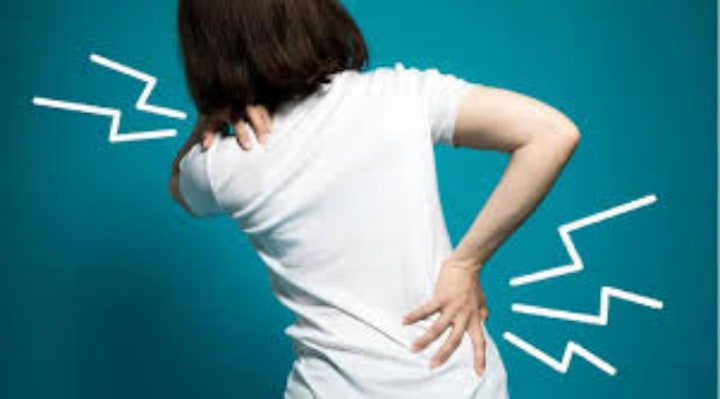Weight loss to help knee pain
It's not much harder as you think..

Carrying excess weight puts significant stress on the spine, joints, and muscles of the back. The spine serves as the central support system of the body, and when subjected to excessive weight, it can become compressed, leading to pain and discomfort. Additionally, the added weight alters the distribution of force throughout the body, affecting posture and spinal alignment.
One of the primary effects of excess weight on the back is increased stress on the intervertebral discs. These discs act as shock absorbers between the vertebrae, providing cushioning and allowing for flexibility. However, when excess weight is present, these discs can become compressed and degenerate more quickly, resulting in conditions like herniated discs or bulging discs. These conditions often manifest as sharp or radiating pain in the back, often accompanied by numbness or tingling sensations.
Moreover, excess weight can contribute to the development or progression of conditions such as osteoarthritis. The additional pressure on the joints, particularly in the spine, hips, and knees, can accelerate the wear and tear of the cartilage, leading to joint pain and stiffness. Osteoarthritis in the spine can cause chronic back pain and limited mobility, affecting daily activities and quality of life.
Furthermore, the muscles of the back also bear the burden of excess weight. The muscles that support the spine and maintain proper posture become strained and fatigued over time. This can lead to muscular imbalances, weakened core muscles, and poor spinal alignment. As a result, individuals may experience chronic back pain, muscle spasms, and difficulty engaging in physical activities.
It's important to note that excess weight not only affects the physical aspects of the back but also has psychological implications. Individuals with back pain due to excess weight may experience decreased self-esteem, body image issues, and a negative impact on their overall mental well-being.
However, there is good news. Losing weight can have a significant positive impact on alleviating back pain and improving back health. By shedding excess pounds, individuals can reduce the strain on the spine, joints, and muscles, thereby relieving back pain and improving overall functionality.
Weight loss can alleviate pressure on the intervertebral discs, allowing them to regain their proper shape and function. As a result, the risk of disc-related problems such as herniations or bulges can be minimized. Additionally, reducing weight helps restore proper alignment and posture, reducing the risk of chronic strain on the back.
Moreover, weight loss contributes to the reduction of inflammation throughout the body. Excess weight is associated with increased levels of inflammation, which can exacerbate back pain. By losing weight, individuals can lower inflammation levels, leading to decreased pain and improved mobility.
DON'T WAIT TO LOOK AND FEEL YOUR BEST – TRY OUR WEIGHT LOSS PROGRAM NOW..! https://tinyurl.com/yc8bwv6x

Strategies for weight loss to alleviate back pain:
a. Exercise and physical activity:
Regular exercise and physical activity play a vital role in weight loss and can significantly contribute to alleviating back pain. Engaging in appropriate exercises helps strengthen the core muscles, improve flexibility, and enhance overall musculoskeletal health. Here are some recommended strategies:
i. Low-impact aerobic activities: Activities such as brisk walking, cycling, or using an elliptical machine can be excellent choices for individuals with back pain. These exercises provide cardiovascular benefits while minimizing impact on the joints and spine.
ii. Yoga and Pilates: These disciplines focus on core strength, flexibility, and proper body alignment, making them ideal for individuals with back pain. Yoga poses and Pilates exercises can help improve posture, increase spinal flexibility, and strengthen the muscles that support the back.
iii. Swimming: Swimming is a low-impact exercise that provides a full-body workout. The buoyancy of water reduces stress on the joints, making it an excellent choice for individuals with back pain. Swimming strokes and water exercises help strengthen the muscles, improve cardiovascular fitness, and enhance overall body flexibility.
b. Nutrition and dietary considerations:
While exercise is crucial for weight loss, it must be complemented by a healthy and balanced diet. Proper nutrition can support weight loss efforts and help alleviate back pain. Consider the following strategies:
i. Balanced diet: A well-balanced diet includes a variety of fruits, vegetables, whole grains, lean proteins, and healthy fats. These provide essential nutrients while helping control calorie intake.
ii. Portion control: Monitoring portion sizes is essential for weight loss. Eating smaller, more frequent meals throughout the day can help maintain steady blood sugar levels and prevent overeating.
iii. Hydration: Drinking an adequate amount of water is essential for overall health and weight loss. Staying hydrated supports metabolism, digestion, and joint health.
iv. Anti-inflammatory foods: Incorporating foods with anti-inflammatory properties can benefit individuals with back pain. Examples include fatty fish (rich in omega-3 fatty acids), leafy green vegetables, berries, nuts, and seeds. These foods can help reduce inflammation in the body, potentially alleviating back pain.
It is important to note that before starting any weight loss or exercise program, individuals should consult with a healthcare professional, especially if they have pre-existing medical conditions or chronic back pain. They can provide personalized recommendations based on the individual's specific needs and limitations.
By implementing a combination of suitable exercises and following a balanced diet, individuals can enhance their weight loss efforts while addressing their back pain. It is important to maintain consistency and gradually increase exercise intensity to avoid overexertion or exacerbating back pain. Additionally, tracking progress and seeking guidance from healthcare professionals or certified trainers can provide additional support and motivation along the weight loss journey.
DON'T WAIT TO LOOK AND FEEL YOUR BEST – TRY OUR WEIGHT LOSS PROGRAM NOW..! https://tinyurl.com/yc8bwv6x
In conclusion, weight loss can play a significant role in alleviating back pain. Excess weight places additional stress on the spine, joints, and muscles, potentially leading to discomfort and chronic pain. By focusing on weight loss strategies, such as exercise and physical activity, individuals can strengthen their core muscles, improve flexibility, and enhance overall musculoskeletal health. Additionally, adopting a balanced diet that supports weight loss and includes anti-inflammatory foods can further contribute to reducing inflammation and promoting back pain relief. By prioritizing weight loss as a means to address back pain, individuals can improve their quality of life and overall well-being.
About the Creator
Enjoyed the story? Support the Creator.
Subscribe for free to receive all their stories in your feed. You could also pledge your support or give them a one-off tip, letting them know you appreciate their work.






Comments
There are no comments for this story
Be the first to respond and start the conversation.